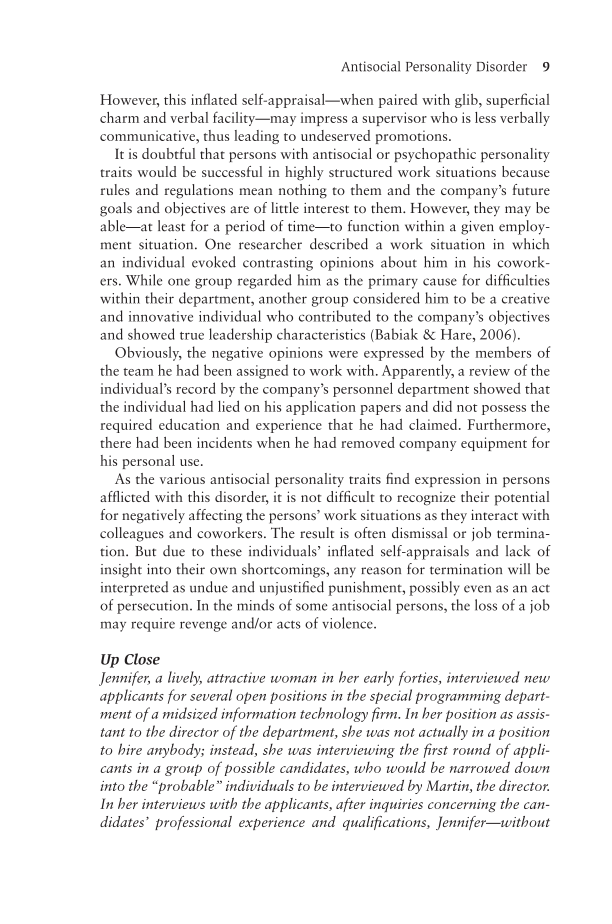Antisocial Personality Disorder 9 However, this inflated self-appraisal—when paired with glib, superficial charm and verbal facility—may impress a supervisor who is less verbally communicative, thus leading to undeserved promotions. It is doubtful that persons with antisocial or psychopathic personality traits would be successful in highly structured work situations because rules and regulations mean nothing to them and the company’s future goals and objectives are of little interest to them. However, they may be able—at least for a period of time—to function within a given employ- ment situation. One researcher described a work situation in which an individual evoked contrasting opinions about him in his cowork- ers. While one group regarded him as the primary cause for difficulties within their department, another group considered him to be a creative and innovative individual who contributed to the company’s objectives and showed true leadership characteristics (Babiak & Hare, 2006). Obviously, the negative opinions were expressed by the members of the team he had been assigned to work with. Apparently, a review of the individual’s record by the company’s personnel department showed that the individual had lied on his application papers and did not possess the required education and experience that he had claimed. Furthermore, there had been incidents when he had removed company equipment for his personal use. As the various antisocial personality traits find expression in persons afflicted with this disorder, it is not difficult to recognize their potential for negatively affecting the persons’ work situations as they interact with colleagues and coworkers. The result is often dismissal or job termina- tion. But due to these individuals’ inflated self-appraisals and lack of insight into their own shortcomings, any reason for termination will be interpreted as undue and unjustified punishment, possibly even as an act of persecution. In the minds of some antisocial persons, the loss of a job may require revenge and/or acts of violence. Up Close Jennifer, a lively, attractive woman in her early forties, interviewed new applicants for several open positions in the special programming depart- ment of a midsized information technology firm. In her position as assis- tant to the director of the department, she was not actually in a position to hire anybody instead, she was interviewing the first round of appli- cants in a group of possible candidates, who would be narrowed down into the “probable” individuals to be interviewed by Martin, the director. In her interviews with the applicants, after inquiries concerning the can- didates’ professional experience and qualifications, Jennifer—without
Document Details My Account Print multiple pages
Print
You have printed 0 times in the last 24 hours.
Your print count will reset on at .
You may print 0 more time(s) before then.
You may print a maximum of 0 pages at a time.


























































































































































































































































